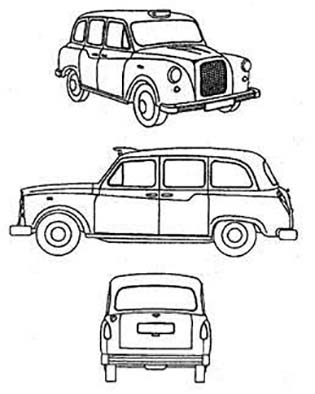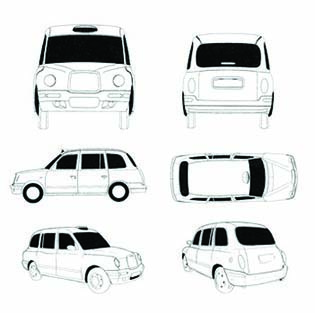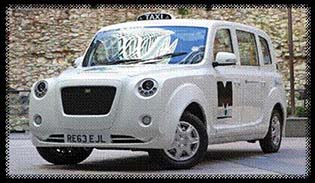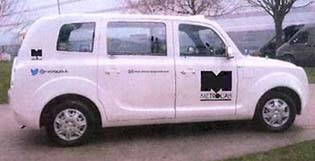The London Taxi Company (LTC), successor in title to the manufacturer of various London taxi models, sued Ecotive and Frazer Nash Research Limited (FNR) for trademark infringement and passing off based on goodwill in the shapes of the Fairway, TXI, TXII and TX4 London taxi models. Ecotive and FNR are the manufacturers of the "Metrocab", a new hybrid taxi.
Ecotive and FNR denied infringement and challenged the validity of the trademarks, contending that they lack distinctive character and consist exclusively of the shape giving substantial value to the goods.
The trademarks
On 5 October 1998, London Taxi Company ("LTC") registered a Community trademark (as shown below on the left) for "motor vehicles" in Class 12, consisting of a three-dimensional mark influenced by the appearance of the Fairways taxi model. LTC also registered a UK trademark based on the TXI and TXII taxi models on 1 December 2006, for taxis in class 12 (as shown below on the right).


The Defendants' Metrocab at the centre of the dispute is shown below:


LTC sued Ecotive and FNR for infringement of (i) Directive Article 5(1)(b) and Regulation Article 9(1)(b) (infringement where there is a likelihood of confusion); and (ii) Regulation Article 9(1)(c) and Article 5(2) of the Directive (infringement where a mark has goodwill and reputation).
FNR and Ecotive denied infringement, counterclaiming that (a) the marks lacked distinctive character, (b) the marks consisted exclusively of the shape giving substantial value to the goods; and (c) the Community trademark should be revoked for non-use during the five years foregoing the counterclaim.
Distinctive character
Arnold J stated that the marks did not have inherent distinctiveness.
In determining whether the marks had acquired a distinctive character, Arnold J applied Nestle v Cadbury, requiring the trademark owner to establish that because of the mark, and at the relevant date (being the date of the counterclaim), a significant proportion of the relevant class of persons recognised the relevant goods or services as deriving from the proprietor.
The relevant class of persons, or average consumer, was deemed to be the average taxi driver as a consumer of taxis as "goods", as opposed to members of the public who were considered as consumers of taxi "services".
It was concluded that, rather than deeming the shape of the taxis as an indication of the source of the goods, the average consumer - whether taxi drivers or consumers of taxi services - would view the trademarks as variants of the standard shape of a licensed London taxi.
As such, Arnold J found that the marks lacked acquired distinctive character and were invalid.
It is interesting to note that LTC did not adduce any survey evidence, nor evidence from any trade or professional association, to support its contention that the marks had acquired distinctive character.
Shape giving substantial value to goods
In addition, Arnold J found that the marks were invalid in respect of Class 12 goods as their shape added substantial value to the goods. In other words, the shape's visual features are key to establishing the market value of the car and are also a principal reason for the decision to buy the product. In arriving at this conclusion, Arnold J considered the decision in Hauck v Stokke, in which comparing the trademarked shape with the shapes of equivalent articles was found to be relevant in determining whether a shape would be excluded from registration.
Ultimately, Arnold J held the marks to be invalid and noted that a monopoly to protect the shape, in the form of a registered design, would be deliberately limited in time. In other words, LTC had chosen the wrong IP right to protect its car designs.
Revocation for non-use
Article 51 of Directive 2008/95/EC provides that a trademark may be liable for revocation if it has not been put to genuine use within a continuous period of five years. LTC had not produced the Fairway model for up to a decade before the relevant period, however it argued that the second-hand sales of the taxis and scrap sales constituted genuine use.
Arnold J concluded that the Community trademark was invalid for non-use, noting that selling the vehicles for scrap involved the destruction of the goods bearing the trademark, and that such an act is "the antithesis of trademark use". Ultimately, the recirculation of goods put on the market many years ago and selling the recirculated goods at a small portion of the price of the new taxis did not generate a share of the market for vehicles exhibiting the trademark.
Trademark infringement
Arnold J also considered the issue of infringement on the assumption that the trademarks were valid and reached the following conclusions:
- No likelihood of confusion exists between LTC's taxis and the new Metrocab, whether from the point of view of the taxi drivers or the consumers of taxi services. Arnold J reached this conclusion due to both the lack of similarity between the marks as well as the lack of distinctive character of the marks.
- As to whether the Defendant infringed on the basis of taking advantage of the reputation of the mark, Arnold J found there is nothing indicating that the Metrocab is exploiting the reputation of LTC's cabs, as consumers can appreciate the difference between the models and that the only association is that they are types of licensed London taxi.
- Metrocab's design does not amount to unfair competition with LTC; the use amounts to honest practice. As such, Arnold J held that Ecotive and FNR would have a defence under Article 12(b)/Article 6(1)(b) of the Directive if the marks had been held valid and infringed.
Passing off
Arnold J noted that in relation to passing off it was open to LTC to plead its case differently to that relied on for distinctive character in relation to the trademarks. In particular, he noted that it was open to LTC to rely on the "family resemblance" of various aspects of the design of the cabs through the four versions of the design. He did not regard such a claim as without difficulty. In any event LTC had not framed its case in this manner.
Arnold J rejected LTC's claim for passing off due to the lack of goodwill and reputation, on much the same grounds as he rejected the claim of distinctive character of the trademarks, as above. With regards to its goodwill, LTC was unable to prove that the distinguishing characteristics of its taxi models establish that they are the source of London taxis to consumers of taxi services, as opposed to communicating that the vehicle is providing licensed London taxi cab services.
LTC's claim for passing off also failed on grounds of misrepresentation as there was no indication that Metrocab was representing itself as emanating from the same manufacturer as LTC's taxis; it was unlikely that consumers of taxi services would think the Metrocab was manufactured by LTC and no intention to deceive was involved. In consequence of these findings, no damage arises.
Conclusion
LTC's UK and CTM shape marks were found invalid; had they been valid no infringement would have been found; and had infringement been found then the defendants would have had a defence. LTC's claim for passing off also failed.
Key to the outcome of the case is an understanding that LTC was seeking protection for trademarks registered in relation to goods i.e. the cabs themselves, as opposed to licensed London taxi services. It is also interesting to note that LTC did not adduce survey evidence from purchasers of London taxis i.e. taxi drivers regarding their views of the shape of the taxi.